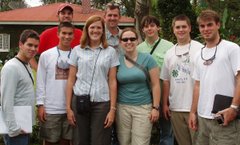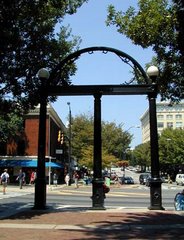 Several weeks have passed since we stood on the tallest mountain in Africa. Yet every time I take a moment and reflect on the experience, the memories are still very vivid. After saying goodbye to all of the sane students and faculty that were not climbing Mt. Kili, the rest of us boarded a bus for the town of Moshi, where we stayed the night in one of “Mama” Zara’s hotels. That night, I tried to savor every instance of comfort, such as a warm shower, running water, good food, and an abundance of oxygen. Despite my attempts at sleep, the morning came quickly, and the much anticipated climb began on June 5.
Several weeks have passed since we stood on the tallest mountain in Africa. Yet every time I take a moment and reflect on the experience, the memories are still very vivid. After saying goodbye to all of the sane students and faculty that were not climbing Mt. Kili, the rest of us boarded a bus for the town of Moshi, where we stayed the night in one of “Mama” Zara’s hotels. That night, I tried to savor every instance of comfort, such as a warm shower, running water, good food, and an abundance of oxygen. Despite my attempts at sleep, the morning came quickly, and the much anticipated climb began on June 5.
Our lead guide, Yussef, was incredible. He was “all smiles” and my admiration for him just kept growing throughout our journey. Our first day was probably the easiest in rigor. Our goal was to hike about 4 miles to the Mandara Hut, a journey that took us primarily through the rainforest. As Yussef explained, our trek would take us through several distinct climate zones, including the rainforest, alpine desert, and ice cap. Throughout our trek, Muhammad, an assistant guide that led our group, told us that the theme for the trip was, “Pole, Pole,” which means to go “slow, slow” in Swahili. He warned that at such high elevations, one must not over exert themselves because it can reduce your chances of making it to the summit.
The next day, we hiked to the Horombo Hut (3720 Meters above sea level). As we left Mandara, I began to see the vegetation change from lush rainforest to lower lying plants. I also realized how high we were because the cloud level was below me. It truly felt like I was in another world. When the clouds would break, you would get a peek of the world down below. In addition to changes in vegetation, we got to see the weather change as well. Not only did we see rain and high winds, but also a noticeable drop in temperature. Once we got to Horombo, we stayed here for two nights to acclimate to the altitude. On the third day, we hiked about 3-4 hours up toward the summit and then back down to Horombo. The weather was great, despite being a little chilly, and I finally got to see the summit of Kili. Despite appearing so far away, I must admit that to actually see the summit, at last, was a good feeling.
Surprisingly, the food was excellent during our trek. Every meal included coffee, hot water, and Milo, a form of hot chocolate. Breakfast often included bacon, sausage, oatmeal, eggs, and potatoes. Lunch consisted primarily of boxed lunches. Sometimes, we were served hot lunch though, which was a nice surprise after hiking for several hours. I most looked forward to the dinners because it was a great time to enjoy a comfort meal with the whole group. We also knew that we were done hiking for the day. Meals were always served family style, so you had to be ready to grab your share! Our group consisted of 22 people crowded over a picnic table that comfortably sat about 12 people. Thus, our group became comfortable with each other very quickly. Showers were non-existent. Will Curry saved the day because he packed disposable shower cloths, and had enough to share with me. Since there was no running water on the mountain, I quickly discovered how much I take running, hot water for granted. The lack of access to water made brushing my teeth, cleaning my hands, and washing my face so much more difficult. The experience definitely showed me how well I have it in the U.S.
The next day, we headed to the last hut before the summit, Kibo Hut (4750 meters above sea level). In order to get to Kibo, we had to cross a huge alpine desert that seemed endless. I could literally see the trail for miles because we were heading into a valley before our last push for the summit. The vegetation became nearly non-existent at these elevations. The ground was hard red clay, with a few cactus type plants dotting the landscape. I honestly felt that I was like Jesus spending forty days in the desert because it didn’t seem like I was making any progress in reaching Kibo. However, after about 7 miles of hiking, we made it to Kibo.
Suddenly, as we reached Kibo, the mood in the group became much more serious. Everyone was tired and ready to quit, but the feeling of being at the last hut before the summit convinced everyone that the prize was finally in sight. The most discouraging aspect at this point was that we arrived at Kibo at around 5 PM and would leave for the summit only a few hours later. We would be served dinner, and then try to get about 2 hours of sleep before making the final push to the summit. Thus, we weren’t even going to get a full night of sleep before our final push. At about 10 PM, Yussef and Muhammad came in and woke us up. Oh and by the way, the temperatures were extremely cold. I was completely covered from head to toe in warm clothing. My headlamp was ready to go, and my hand and toe warmers were already cranking! Even though we were very close to the summit, it would still take us about 8 hours in total to reach the summit because it was extremely important for us to go “Pole, Pole.” Even I noticed that the slightest exertion of energy would leave me breathless. At this point in the trek, a few people began turning back due to altitude sickness. We were now well above 15000 feet. People began getting intense headaches and having to throw up. As each hour went by, it felt as if we were going nowhere. I would constantly look up and see no end in sight. However, after about 5 hours of climbing up a steep face of the mountain, we finally reached the rim of Mt. Kilimanjaro, called Gilman’s Point. From here, it would be another 2 ½ hours around the rim before reaching the actual summit. By this time, snow was falling (in June) and the entire landscape became a whiteout. In addition to the now, the wind was whipping at speeds that made you think you would be blown off the mountain. After 2 ½ long hours of slowly moving through the snow, we finally made it to the top! The weather actually began to subside and the sun came out, which made our view spectacular. I cannot even begin to describe how clear the air was up there. Everything was so pure in nature.
Being at the top truly was a surreal moment. Now that I am back to normal life, I sometimes wonder if I took in the moment of being on the tallest mountain in Africa long enough. Even though the trek was only 6 days, they were 6 grueling days. One might tell you that you cannot change in 6 days. Well, I would beg to differ. The experience of climbing Kili was a life changing experience. The experience was a physical challenge, an emotional challenge, and psychological challenge. By making it to the summit, it showed me, along with others, that perseverance and a will to succeed are vital to life. Making it to the summit represented a bigger challenge to many of us. It told many of us that we can achieve great things when we allow our mind to work for us and not against us. The mind is a powerful tool in convincing us that we cannot do certain things. Well, these 6 days showed how an individual can accomplish much more than they ever imagined if they use their mind to work in their favor. We must believe in ourselves before we can even begin to fathom and experience our full potential.




























